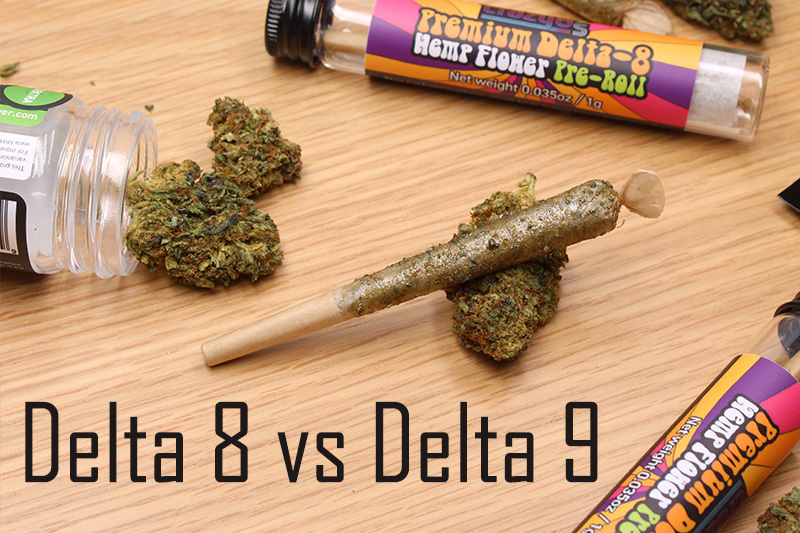Delta-8 and delta 9 tetrahydrocannabinol (THC) are two compounds found in cannabis that has gained popularity in recent years. While both compounds are psychoactive and share some similarities, there are also some key differences between them. In this article, we will explore the difference between delta-8 vs. delta-9 THC.
What is Delta 8 THC?
Delta-8 THC is a minor cannabinoid found in cannabis, which means it is present in smaller amounts than delta-9 THC. Delta-8 THC has a similar chemical structure to delta-9 THC but has some differences in the placement of a double bond. This difference in structure gives delta-8 THC some unique properties.
Delta-8 THC is reported to have a more subtle psychoactive effect than delta-9 THC, which can make it a good option for individuals who are sensitive to the psychoactive effects of cannabis. It is also reported to have a less intense effect on anxiety and paranoia, which can be a concern for some individuals when using delta-9 THC.
What is Delta-9 THC?
Delta-9 THC is the primary psychoactive compound found in cannabis. It is responsible for the “high” associated with cannabis use. Delta-9 THC binds to cannabinoid receptors in the brain and central nervous system, leading to a range of effects such as euphoria, relaxation, and altered perception.
Delta-9 THC is commonly found in cannabis strains and is typically consumed by smoking or vaping the plant material. It is also found in a range of other cannabis products such as edibles, tinctures, and concentrates.
What are the Differences between Delta-8 vs. Delta-9 THC?
Legal Status
Delta-8 THC is currently legal at the federal level in the United States, thanks to a loophole in the 2018 Farm Bill that allows for the production and sale of hemp-derived products containing less than 0.3% delta-9 THC. This means that delta-8 THC products can be sold and consumed in most states, although some states have taken steps to ban or restrict their use.
Delta-9 THC, on the other hand, is still illegal at the federal level in the United States, although many states have legalized it for medical or recreational use. It is important to check the laws in your state before purchasing or consuming delta-9 THC products.
Psychoactive Effects
Delta-8 THC is reported to have a more subtle and less intense psychoactive effect than delta-9 THC. This means that it may be a better option for individuals who are sensitive to the psychoactive effects of cannabis or who want a milder high.
Delta-9 THC, on the other hand, is known for its strong psychoactive effects. It can lead to feelings of euphoria, relaxation, and altered perception. It is important to start with a low dose of delta-9 THC and be patient, as the effects can take longer to kick in than smoking or vaping.
Medical Benefits
Both delta-8 and delta-9 THC have been reported to have a range of potential medical benefits, including pain relief, anxiety relief, and appetite stimulation.
Delta-8 THC has been shown to have anti-inflammatory and pain-relieving properties, making it a potential option for individuals with chronic pain or inflammation. It has also been reported to have a less intense effect on anxiety and paranoia than delta-9 THC, making it a potential option for individuals who experience these side effects when using cannabis.
Delta-9 THC has been shown to have a range of potential medical benefits, including pain relief, anxiety relief, and appetite stimulation. It has also been used to treat conditions such as nausea, glaucoma, and muscle spasms.
Availability
Delta-8 THC is still a relatively new compound, and as a result, it is not yet as widely available as delta-9 THC. However, it is becoming increasingly popular, and there is now a range of products available that contain delta-8 THC, including edibles, tinctures, and vape cartridges.
Delta-9 THC is more widely available and can be found in a range of cannabis products, including flower, concentrates, edibles, and tinctures. However, the legality of these products varies depending on the state and can be restricted to medical use only in some cases.
Side Effects
Both delta-8 and delta-9 THC can cause side effects, although the severity and type of side effects can vary depending on the individual and the dose.
Delta-8 THC is reported to have a less intense effect on anxiety and paranoia than delta-9 THC, which can be a concern for some individuals when using cannabis. However, it can still cause side effects such as dry mouth, red eyes, and increased heart rate.
Delta-9 THC can cause a range of side effects, including anxiety, paranoia, dry mouth, red eyes, and increased heart rate. It can also impair memory and cognitive function, making it important to use it with caution.
Conclusion
Delta-8 and delta-9 THC are two compounds found in cannabis that share some similarities but also have some key differences. Delta-8 THC is a minor cannabinoid that is reported to have a more subtle and less intense psychoactive effect than delta-9 THC. It is also legal at the federal level in the United States, making it more widely available than delta-9 THC.
Delta-9 THC is the primary psychoactive compound found in cannabis and is known for its strong psychoactive effects. It is also used for a range of medical conditions, including pain relief, anxiety relief, and appetite stimulation.
It is important to understand the differences between delta-8 and delta-9 THC and to use cannabis products with caution, starting with a low dose and being aware of potential side effects. It is also important to check the legality of cannabis products in your state before purchasing or consuming them.


